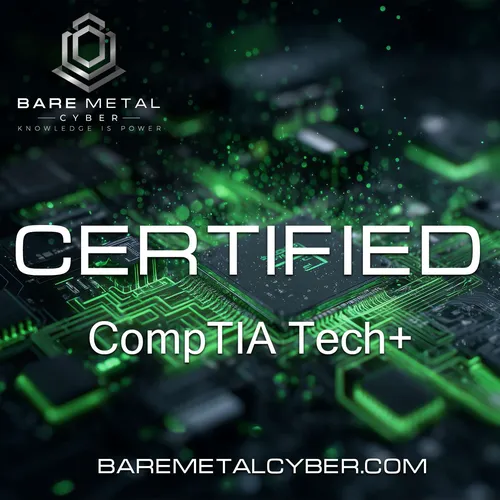
Certified - CompTIA Tech+ Audio Course
The Tech+ Audio Course is a complete audio study companion for the CompTIA Tech+ (FC0-U71) certification exam, designed to guide learners through every domain and objective. Each episode delivers clear explanations, practical examples, and exam-focused insights to help you build confidence and technical readiness. Whether you are new to IT or preparing for your first certification, this PrepCast provides structured support from start to finish.
- Update frequency
- every day
- Average duration
- 13 minutes
- Episodes
- 59
- Years Active
- 2025

Episode 59: Prepcast Supercut (All Episodes)
The Tech+ PrepCast Supercut brings together all 58 episodes into one complete study resource for the CompTIA Tech+ (FC0-U71) certification exam. Covering every domain, glossary term, and exam objecti…

Episode 58: Wireless Security Settings: SSID, WPA2, and WPA3
This episode covers the essential security settings for configuring a small wireless network. We explain how to change the default SSID, set strong passwords, and choose between encryption standards …

Episode 57: Encryption Use Cases: Data at Rest vs. Data in Transit
This episode explains how encryption protects data in two primary states—when stored (data at rest) and when moving across networks (data in transit). We define plaintext and ciphertext, along with e…

Episode 56: Password Management: Complexity, Rotation, and Managers
This episode examines best practices for creating and managing secure passwords. We explain why password length, complexity, and uniqueness are essential to reducing the risk of compromise. You will …

Episode 55: Safe Browsing: Certificates, Sites, and AI Risks
This episode focuses on safe browsing practices to protect user data and system integrity. We explain how to verify website security using valid certificates, recognize potentially malicious sites, a…

Episode 54: Software Practices: Licensing, Sources, and Updates
This episode covers the best practices for managing software, from verifying licensing compliance to ensuring secure sourcing and regular updates. We explain the differences between open source, prop…

Episode 53: Device Security: Phishing, Malware, and Hardening
This episode addresses key strategies for securing devices against common threats. We cover security awareness measures, such as recognizing phishing attempts, and the importance of anti-malware tool…

Episode 52: Authentication and Authorization: Models and Logging
This episode focuses on the processes of authentication and authorization, explaining how they verify identity and determine permissions. We outline common authentication methods, from single-factor …

Episode 51: Security Concepts: CIA, Privacy, and Frameworks
This episode explores the foundational concepts of information security, beginning with the CIA triad—confidentiality, integrity, and availability. We explain how each principle guides security decis…

Episode 50: Security: Domain Overview
This episode introduces the Security domain, which covers essential principles, best practices, and protective technologies for safeguarding systems and information. You will learn how this domain ad…

Episode 49: Backup Strategies: File, System, and Storage Locations
This episode covers the principles of data backup, including file-level backups, full system backups, and restore procedures. We explain different storage locations, from local media like external dr…

Episode 48: Database Structures: Relational and Non-relational Explained
This episode compares relational and non-relational database structures, explaining when each is most effective. We define relational components such as tables, rows, columns, and keys, as well as no…

Episode 47: Databases in Action: Usage, Speed, and Structure
This episode focuses on the practical uses of databases, including creating, querying, and generating reports. We explain the advantages of databases over flat files, such as scalability, speed, and …

Episode 46: Data Value: Analytics, Reporting, and Monetization
This episode explains how organizations treat data as a valuable asset, exploring its role in decision-making, reporting, and revenue generation. We cover the difference between critical and non-crit…

Episode 45: Data and Database Fundamentals: Domain Overview
This episode introduces the Data and Database Fundamentals domain, explaining how it addresses the value of data, database structures, and backup concepts. You will learn why this domain is crucial f…

Episode 44: Code Organization: Pseudocode, Flowcharts, and Logic
This episode explains organizational techniques used in programming, including pseudocode, flowcharts, and logic structures. We describe how pseudocode provides a language-agnostic plan for developme…

Episode 43: Programming Concepts: Variables, Functions, and Objects
This episode covers the core concepts of programming, focusing on variables, functions, and objects. We explain how variables store and manipulate data, how functions encapsulate reusable logic, and …

Episode 42: Data Types: Char, String, Integer, Float, Boolean
This episode reviews the fundamental data types used in programming, including characters, strings, integers, floating-point numbers, and Boolean values. We define each type, explain its purpose, and…

Episode 41: Programming Language Types: Interpreted, Compiled, and More
This episode explains the different categories of programming languages, including interpreted, compiled, scripting, markup, and query languages. We discuss how interpreted languages execute code lin…

Episode 40: Software Development Concepts: Domain Overview
This episode provides an overview of the Software Development Concepts domain, outlining the skills and knowledge areas it covers. You will learn about programming language categories, fundamental da…